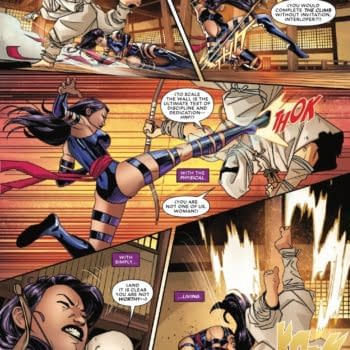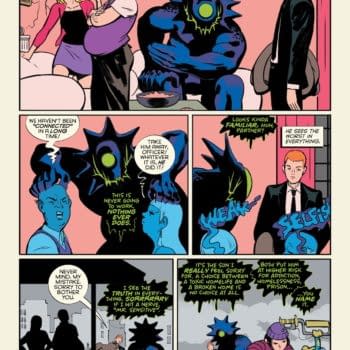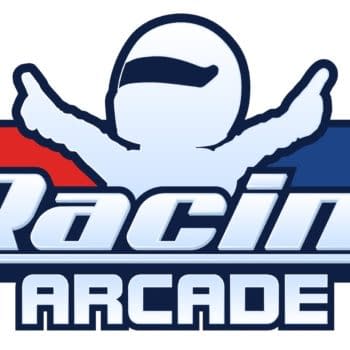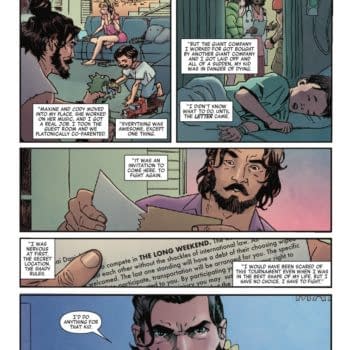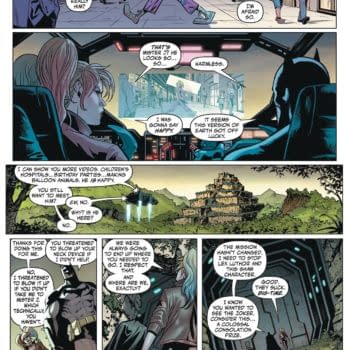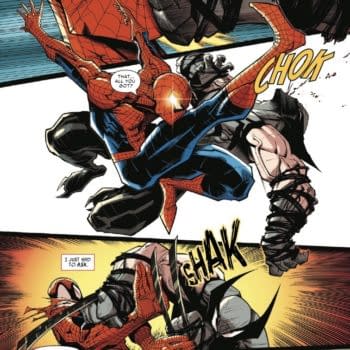Posted in: Comics, Recent Updates | Tagged: Comic Book Creator Magazine, comics history, dark horse, Denis Kitchen, entertainment, Harvey Cruse. Kitchen Sink Press, harvey kurtzman, Jon B. Cooke, robert crumb, stan lee, The Best of Comix Book, The Spirit, TwoMorrows, underground comix, will eisner
As 'Hip And With It' As Marvel Would Allow – Denis Kitchen On Working With Robert Crumb, Will Eisner, And Stan Lee At Heroes Con 2014
Any con-going needs those moments of sitting in a pleasant panel and learning something about comics that reminds you why you love the medium, and hearing Jon B. Cooke of Comic Book Creator Magazine and publisher Denis Kitchen of Kitchen Sink Press in conversation on Saturday morning at HeroesCon was definitely one of those moments for me. Their combined knowledge of comics is so vast that hearing their stories is like attending a full lecture series on comics anywhere else (provided you could find one to attend).
Kitchen explained that he never had any interest in the superhero genre, other than a parody of it, like something like the Spirit, which was "decidedly offbeat" even when new, and that his interests led him to take an "idiosyncratic path" with no regrets.
Taking us back to his own history in Underground Comix, he said that Mom's Homemade Comics "spontaneously" sprang up as a generation of young cartoonists responding to "generational imperatives". His generation was of the late 60's, a counterculture that grew their hair long, "puffed some joints", and decided they wanted to use comic books to "say something". They were not out to "create fantasies" but deal more with reality.
Cooke asked how aware Kitchen was of what was going on in San Francisco at the time and Kitchen replied that he was "aware that there was a youthful movement" there but didn't see Crumb's Zap Comix until a year later since it took awhile to filter into Midwest where he was, but Underground Comix were something that was "spontaneously happening all over the country". Initially, he created a campus publication of Mom's Homemade Comics but the editor ran off with treasury, which led him to change the name, go to a printer, and ask how many copies he could have made for the money he had. The answer was 4000 copies, which he priced at 49 cents each, and later reprinted at 50 cents.
Kitchen reflected that what set him apart from contemporaries is that he had an instinct for business. So he "hustled" the product and went around to every retailer, used bookstores, and corner drug stores, and put a stack of comics on the counter. They were happy to help the "local artist" and he did local advertizing. Within a couple months, he had sold all but about 500 copies.
At that point, one of his roommates was going to San Francisco, and sold the rest there for him. Then he started getting calls from people in San Francisco. Gary Arlington had inherited the Underground Comix scene, and asked to sell the last 500 comics and Print Mint asked to reprint them. Kitchen at that time wanted to simply draw at home and let someone else deal with printers and distribution so he agreed. If Bob Rita at Print Mint had been honest with him, Kitchen would have stayed simply an artist, but he concluded otherwise when he received no "accounting" of sales with the check that finally arrived for the reprint sales. There was no clarification of the run or how the royalties were gathered. By sending nothing but a check, Rita made Kitchen suspicious, so he called on the phone and "mildly" asked for numbers, only to be asked "Are you calling me a crook?" Kitchen concluded that "maybe he was" based on that defensive response.
A short time later, Kitchen started self-publishing, and made the mistake of mentioning to others that Rita's Print Mint wasn't honest, and he started getting irate phone calls. A year later in Berkeley, Kitchen laughed, "a black-belt 300 pound Samoan" came up to him at a party, confronting him and he realized he was facing Rita. He expected to be a "bloody pulp" but thankfully the host at the party intervened.
Cooke wondered if the publication of Kitchen's comic in San Francisco got the attention of Crumb, and Kitchen explained that Crumb was in San Francisco, but had previously been in the Midwest and Delaware. Crumb and Kitchen had a lot in common and Crumb visited him in the Midwest, which was encouraging for him. Crumb wasn't fond of Print Mint either, so gave Kitchen his next comic to publish. From the beginning, Kitchen said, Crumb was "the major force" in Underground Comix, a "singular figure" who had "brand recognition".
Many Zapp and Freak Brothers comics were printed over and over, and had a huge impact on readers. Their secret to success was that, unlike mainstream comics that would only be on the rack for one month per issue, Underground Comix stayed and "sold and sold". They might have a different cover each time, but they were like paperback books, since as long as they were selling, you could find them. As a publisher, Kitchen found himself continually reprinting things. Kitchen said that Homegrown Funnies went through 12 printings, but others he printed usually had 7 or 8 at least and it was rare for something not to be reprinted at least once. 10,000 copies was his starting point as a minimum, which now would seem like a "big deal".
Cooke asked whether Kitchen ever tried to entice Crumb to become exclusive to his imprint and Kitchen explained that he "naively thought that if earned loyalty, I would get exclusivity. But he was egalitarian and would alternate publishers, and wanted healthy competition". Crumb also realized the influence he had on the market. But Kitchen was always "scrupulous about accounting", learning from his Print Mint experience, and paid a royalty higher than normal for Crumb, which he later realized that Crumb hadn't even noticed was a factor.
The conversation then shifted to Kitchen's history with Will Eisner, who he met as a businessman in 1971, at one of the first comic cons in New York run by Phil Seuling. A guy with a French accent came up to Kitchen and told him that Eisner wanted to meet him, which he thought must be a mistake, until he was taken to Eisner's hotel suite and learned that Eisner had been paying attention to the Underground. He was "intrigued by the business model of the Underground, which was set up as artist-friendly, they kept their art, and copyright, but allowed editorial freedom". Underground Comix were also distributed in different ways than the news stand, and were non-returnable. Kitchen knew that Eisner was a "living legend". At one point, Kitchen finally asked, "Can I talk to you about the old days?" and very grudgingly Eisner did so, since he "wanted to get back to now". Kitchen feels this was one of Eisner's most "admirable qualities", not remaining stuck in the past. His "moment of glory" was not of interest and he was always trying to learn, and "find a better mousetrap".
Kitchen and Eisner then walked the convention floor together, for Kitchen to show him Underground Comix. He was trying to select something to make a good impression, but instead, Eisner grabbed an S. Clay Wilson comic and opened to a famous page with plenty of taboos being broken, and Eisner "noticeably blanched" when he saw it. Kitchen explained that the "freedom we have includes far out things, but that's not necessarily typical". Another young cartoonist started arguing with them, one Art Spiegelman, who was unknown at that point. After a few minutes, Eisner walked away and Kitchen assumed he had turned him off. But Kitchen had Eisner's business card and after the show, he wrote a letter, and tried to convince Eisner of the significance of Underground Comix through other examples.
Kitchen received a "nice letter" back, saying "You're right, I enjoyed these more". He asked if Kitchen wanted to do some business and Kitchen asked if he could reprint The Spirit, to which Eisner replied, "Why would kids today want to read that old stuff?" Cooke commented further that when he and his brother made a documentary about Will Eisner, one of things that Will said is that after the convention, he took a train ride home thinking about the "creative possibilities of total freedom". So that conversation with Kitchn really was one of those moments that changed the history of comics.
Cooke explained that while The Spirit was reprinted for awhile by Kichen, it was then "stolen away" by Jim Warren. Kitchen followed up by saying that Eisner apologized about that, but Warren was able to get newsstand distribution and Kitchen understood the decision. After issue 16, Eisner and Warren fell out, and Eisner called to ask if there was anything left to publish with Kitchen and if he wanted it. Kitchen continued the series to 41 issues and 87 comic books that were all successful in sales.
Around 1977, Eisner let Kitchen know that he was "working on something new and different" which resulted in Contract with God. It "revolutionized the industry", Kitchen said, and though it was "not technically the first graphic novel, it changed everything". People began seeing the possibilities of the medium, and didn't want to be restricted in format anymore. "Now you walk into comic shop or indie bookstore, Kitchen commented, and graphic novels are the fastest growing format.
Cooke also asked Kitchen, "How do you rectify the fact that you're cartoonist at heart vs. publishing? Is that frustrating?"
Kitchen replied, "Yes, it's eternally frustrating but I've learned to balance things. When you start a business, it controls you, it's a monster but one you try to steer. I found that I could be creative with the business in a different way than I could be creative with a comic. If a cartoonist is more of an actor, the publisher is more of a producer and director, promoting them, and selecting who's on that stage. The most fun is discovering new talent and giving them opportunities. When you take people who are already established and help them, it determines what they are doing next". He works on publishing and cartooning at the same time, using evenings and weekends to draw.

Early on, Kitchen said, Stan Lee offered him a job, and he personally had loved Marvel Comics, (Underground don't always hate mainstream, he reminded), but he didn't want to work in that business model with work for hire. He preferred to own things himself and keep his own art. When Lee offered him a job as an editor, he was flattered and pleased, but said "No". Lee got "hungrier" to hire him and tried several times. In 1973, during a financial crash that threatened Underground Comix, business was shaky for Kitchen, and when Lee called again then, he agreed, "Let's talk".
"We tried to figure out a compromise", Kitchen said, in an "experimental magazine", that would be as "hip and with it", as Marvel would allow. It was originally to be called "Comix International", but the title was taken, so it became ComiX Book. It was good news in that it paid very well for Underground cartoonists and Lee agreed to return original art, and also agreed to give up part of the copyright. Kitchen described it as a "noble experiment".
A few issues into the magazine run, the "special arrangements" that had been made with the Underground artists "leaked" and Kitchen quoted Oscar Wilde saying, "When bankers get together, they discuss money. When artists get together they discuss money". Other artists at Marvel soon realized the situation and demanded the same rights in return. Lee got "cold feet" at that point and cancelled the magazine, since it was something of a "political problem" for Marvel. Since Kitchen had a couple more issues in the can, he published them himself, but by then Kitchen Sink had stabilized financially in the unsteady market, so essentially that short-lived collaboration "saved the company to be subsidized that year".
Cooke also asked Kitchen about the pioneering release of gay-themed comics from Kitchen Sink Press and how that came about. Kitchen related that Howard Cruse was already contributing to anthologies and Barefootz, featured an artist character who was "openly gay, which was rare in comics even undergrounds". Kitchen realized after awhile that is sounded autobiographical and finally asked, "No offense, Howard, but are you gay?" which he confirmed. After more time had passed, Kitchen suggested that he do an also openly gay-themed comic.
Cruse was worried it would affect his freelance work, but eventually agreed, saying that he didn't know any other gay cartoonists, so Kitchen sent out a form letter to their mailing list asking, "Dear Artists, If you are gay" to join his list. There was "some blowback, and some homophobia even among the Underground", Kitchen said, but the letter "worked" because a number of cartoonists came out of the closet to participate.
Cooke asked Kitchen about the discoveries he's made over the years in terms of new talent and what he's been particularly proud of in that vein. Kitchen cited Mark Schultz, whose work he found in a "slushpile of unsolicited submissions" which was a little rough, but was one of the 1% of comics that come in that way and prove to be significant. Schultz turned out to be "one of the best but slowest artists in the business" so what would have been a monthly turned into an annual, but Kitchen was pleased to have it. Cooke pointed out that Schultz now has an IDW artist edition of his work, too. Kitchen also cited Don Simpson of Megaton Man and the creators who did Kings in Disguise, a graphic novel about a 12 year old boy during the Great Depression looking for his father by hopping trains, a "historically important" work. He knew it was a book that "couldn't possibly have sold well", so Kitchen did his best to bring in famous cover artists, like Steve Rude and Mark Schultz so covers would jump. A sequel was later produced from WW Norton titled On the Ropes, further proving its significance as a literary work.
Lastly, Cooke asked Kitchen to talk about his personal life as a "collector" of things.Kitchen likes Juke boxes of the 30-40's, old toy cars, advertizing memorabilia, photos of old cartoonists, buttons, things featuring Nancy, Sluggo, and Li'l Abner. He's mostly collecting postcards these days, those from about 100 years ago, and a lot of them are "mean, sexist, violent", he said, and "not politically correct", but they were the "e-mail of the day", that only cost a penny, and a penny to mail, meaning that "everybody did it every day to communicate". Kitchen finds the images "hilarious", especially the endless postcards about "drunks" which show them leaning against poles and sneaking home. They are treated in a manner making them funny, but today they would not be seen as funny.
"Instead we think of going to jail and domestic violence", Kitchen said, but the "villains in the postcards are the wives, waiting at home with rolling pins and mops. One even had a machete". It's the poor husband, with an evil woman waiting, sometimes holding a baby. Kitchen finds them enlightening and funny, revealing how societal values change and history can be told in different ways. Kitchen's postcards started off as a "curiosity collection", but once he has enough on certain topics, he's thinking of putting together books, in the next couple years, as a "focused social history" as told through these postcards.
"You know things evolve, but you don't always see it in a popular form", Kitchen explained, and also pointed out that some of the postcards are decidedly sequential, like primitive cartoons with "balloons, gag lines" and an attempt to be funny.
Summing up about the changes Kitchen has seen in comics over time, he said that he loves to come to shows like Heroes Con and see new artists as well as discover things. "It's different now", he said, since it's "easier now to get your work out there". People now make their books and take pride in them, often hand coloring, hand stapling, which leads to finding publishers in other ways than using the mail. If you "get a buzz going here, you get a publishing deal", he said. Today, it's a more "viable model", he said to self-publish and attempt to make a living in comics.
An audience member asked Kitchen, in closing, about his recent decision to donate his papers to Columbia University, and he affirmed that, speaking about the vast amounts of correspondence he had collected as a publisher. Between 1969 and 1999, he amassed about 60,000 letters, many of them hand-lettered and drawn on from artists, even the envelopes becoming an art object. Other artists like Eisner would sent him proof cover concepts drawn right into the letter to choose from and "that's how business was done" through the unrushed exchange of letters. Columbia "loved it" and he hopes "future scholars will love it too". He's also donating "most of the mechanicals" to Columbia, the Photostats, headlines, and physical object sheets that printers would then photograph for publication, which may be a "slice of information you couldn't find anywhere else" for students to help fill the "frustrating gaps" for those who love comics history but can't find resources.
Comic Book Creator Magazine #5 featuring Jon Cooke interviewing Denis Kitchen will be available from July 2nd from TwoMorrows Publishing. Denis Kitchen's next book in the Kitchen Sink imprint at Dark Horse will be coming this winter in the form of Harvey Kurtzman's Jungle Book.














